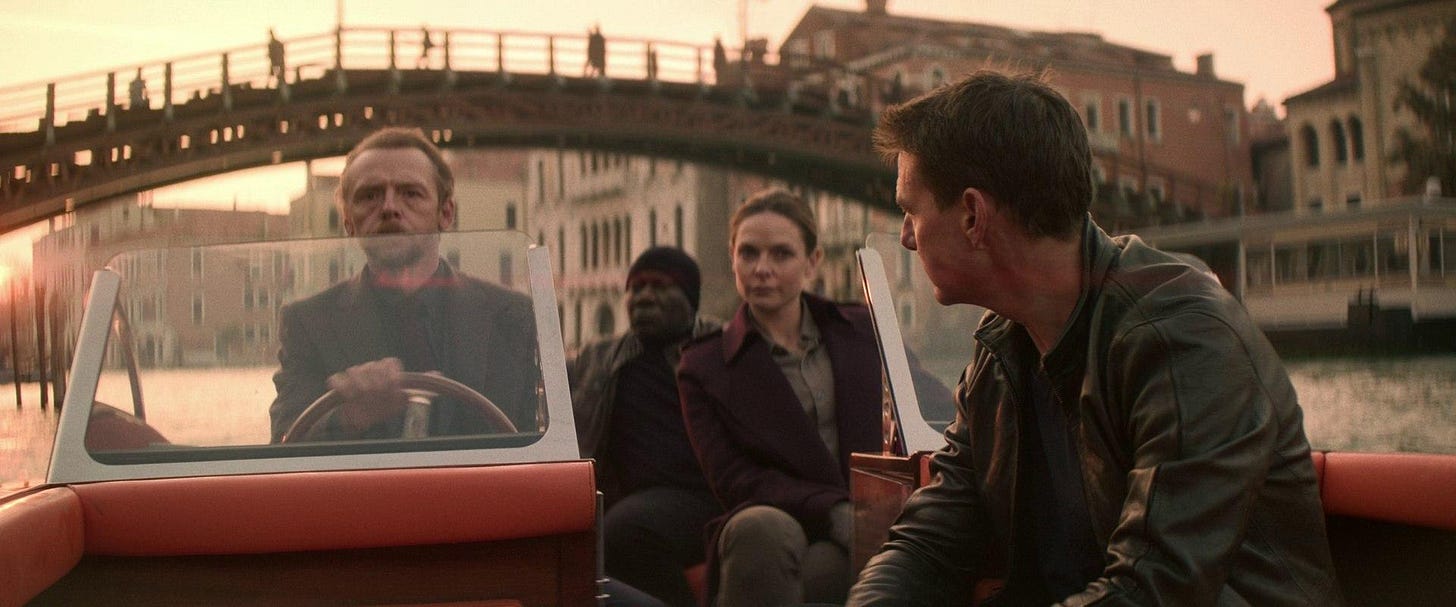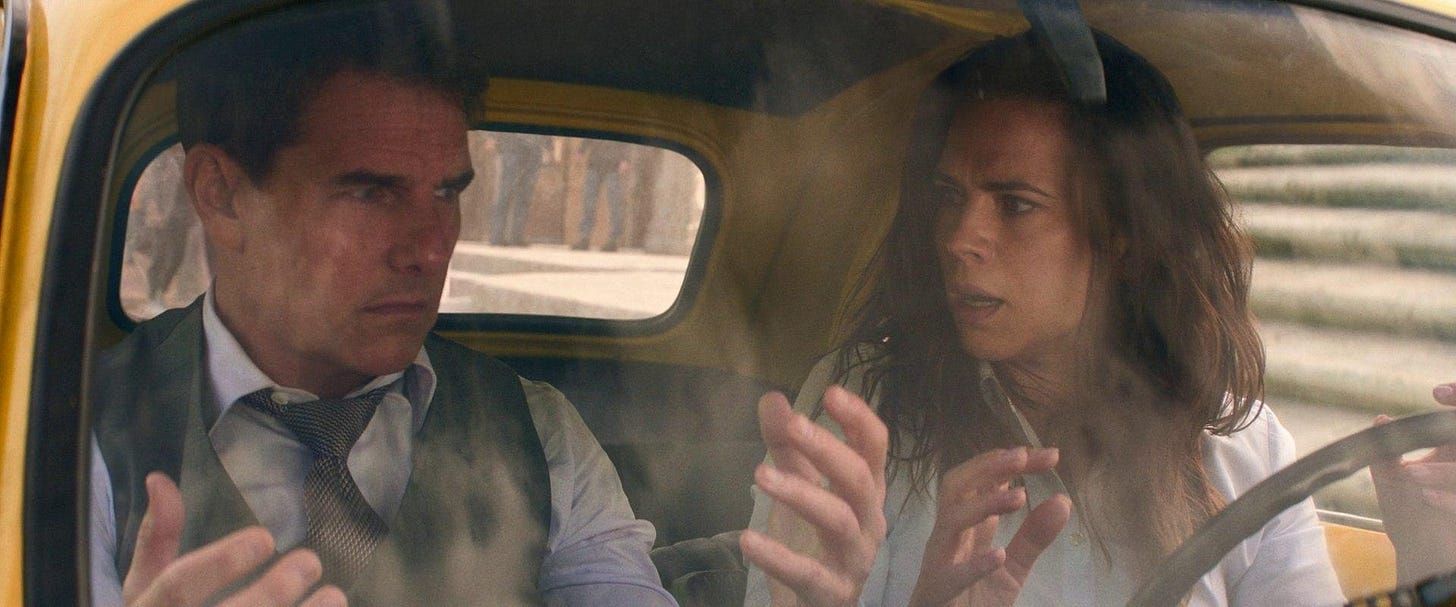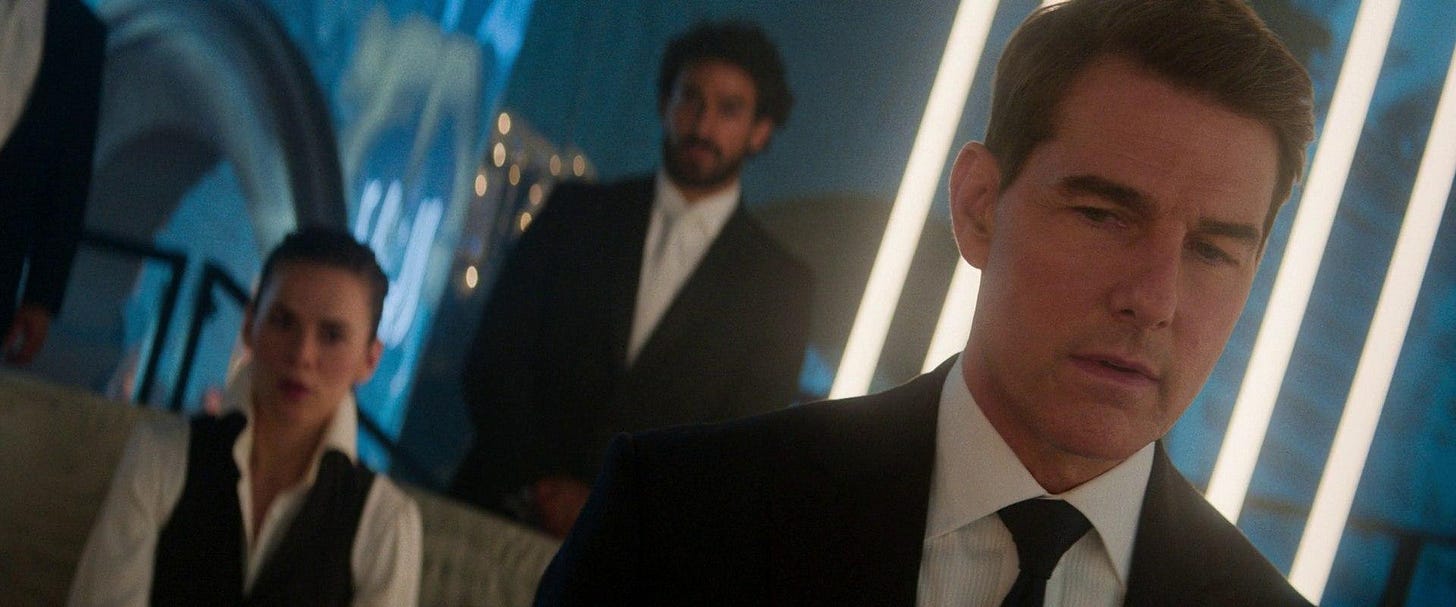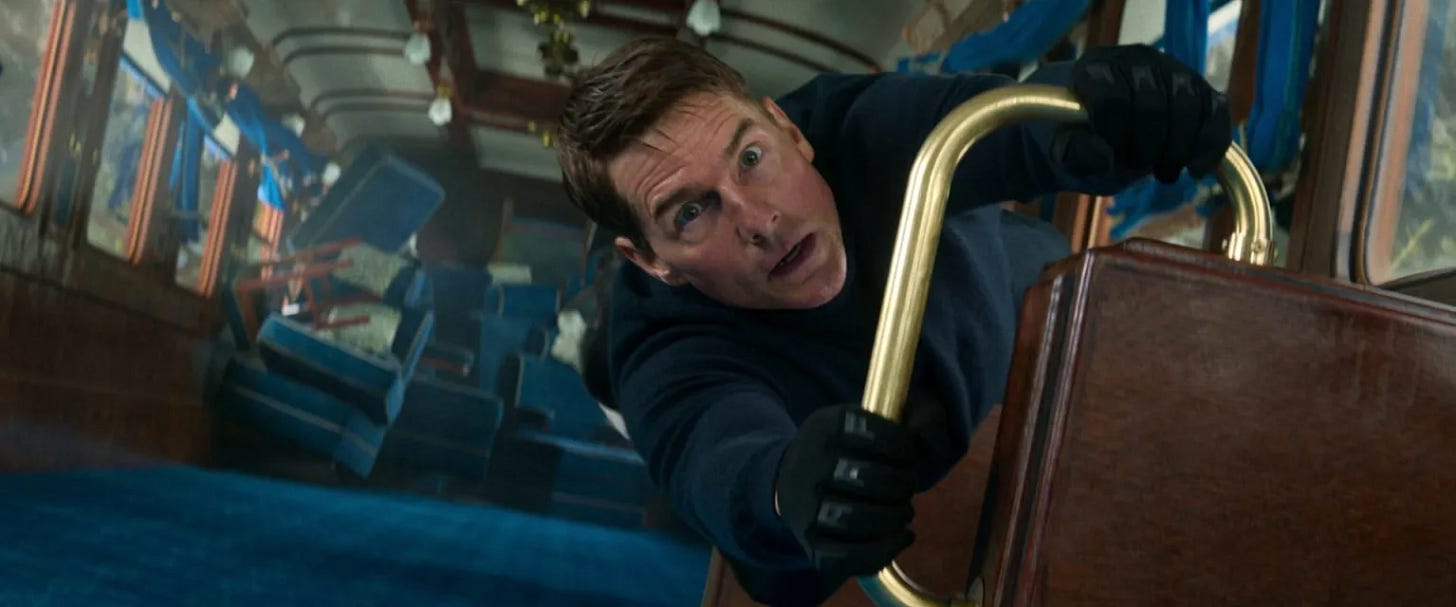Review: "MISSION: IMPOSSIBLE - DEAD RECKONING" elevates the series to its apex
The penultimate installment is also my absolute favorite
“I swear your life will always matter more to me than my own.”
“You don’t even know me.”
“What difference does that make?”
Ethan Hunt is a fan of magic tricks. We learned this way back in the first Mission: Impossible in 1996, in a delightfully goofy scene where a baby-faced Tom Cruise confuses and outwits Jean Reno’s turncoat spy character by playing sleight-of-hand with a data disc like he’s a street magician. Cruise and writer/director Christopher McQuarrie bring back Ethan’s predilection for trickery as a recurring motif throughout Dead Reckoning. Seeing his own gift for sleight-of-hand chicanery mirrored in the film’s new co-lead, Hayley Atwell’s in-over-her-head thief Grace, is what makes Ethan think there might be the spark of a future IMF agent under her capricious exterior. Their mutual aptitude for pickpocketing and keep-away is the throughline on which the entire film moves, and it’s an apt motif to build the action around. This entire series, after all, is in and of itself one big bag of magic tricks.
Case in point: This is a Mission: Impossible that revolves around chasing not just a MacGuffin, but a literal key – the exact significance of what it unlocks we do not learn until near the end of the pushing-three-hours run-time – and yet nothing about the movie or the motivations of its characters ever feels thin. Seven films and 27 years into the run, Dead Reckoning delivers the smartest and most soulful entry yet, filled with all the deliriously creative action one has come to expect from McQuarrie’s direction, but also imbued with a degree of tension, atmosphere, and weight unlike anything we’ve seen from the franchise before. There’s a little bit of existential sadness here, an awareness of the inevitable finality of even a series as remarkable as this one, that makes everything just that much more riveting. ‘Magic’ really might be the only word for it.
Ethan’s sleight-of-hand skills aren’t the only things Cruise and McQuarrie lift from the original Mission: Impossible. Dead Reckoning also brings back Henry Czerny as Eugene Kittridge, the antagonistic IMF bureaucrat who may be the most memorably eerie of Ethan’s various institutional foes (he’s as great here as he was there, reprising the role nearly three decades later without missing a beat). More importantly, McQuarrie shakes the look and feel of his film up with a series of stylistic tics that nod to New Hollywood icon Brian De Palma’s efforts on that first film: most conversations are shot in Dutch angles of varying extremity, always with intent and always making for dynamic and slightly uneasy compositions, and there is a syncopated rhythm to the editing, with cuts coming off the beat at moments you least expect them (the sequence at the club in Venice, for instance, times many of its cuts on plosives in the speech patterns of Esai Morales’ Gabriel). Shot-reverse-shot set-ups sometimes play out with disorienting jump cuts changing the on-screen position of faces, or with intentional breaks in the 180-degree-rule of spatial relations. Combined with the darker tone and slower, more methodical pace, Dead Reckoning wrings a great deal of tension out of even the simplest dialogue or expository scenes. It’s often unsettling, a sense of pervasive disquiet creeping in around the edges, of the world being a bit out of balance, the gravitational axis out-of-whack.
It’s incredibly effective, and McQuarrie’s careful command of tone means that while this is the longest Mission: Impossible yet, it never feels anything less than arresting. The film earns its length not necessarily through narrative overload – though there is a bit more going on here than in most films in the series, more players assembled and higher stakes established – but simply because scenes play out longer, and with greater complexity. McQuarrie constructs a few intricate clockwork spycraft scenes here, including an early standout sequence at an airport and a second-act pursuit through a maze-like Venice at night, that have a huge number of moving parts, multiple inter-cutting planes of action that are all interdependent, each reminding me of the virtuosity of the first film’s best sequence, the team’s break-in at the CIA headquarters in Langley. The Mission: Impossible franchise hasn’t done another scene quite like that one in the years since, save perhaps the incredible opera set-piece in Rogue Nation, McQuarrie’s first at-bat, and one can feel McQuarrie’s enthusiasm at stretching his legs and trying on a different kind of thriller construction here.
Of course, when it comes to the massive, wildly inventive stunt-driven action McQuarrie’s Mission: Impossible entries have excelled at, Dead Reckoning doesn’t skimp. There’s a car chase in Rome involving Cruise and Atwell handcuffed together in a tiny yellow Fiat, and it has all the delirious creativity and note-perfect timing of a great piece of animation; in fact, it heavily reminds me of several such scenes in various Lupin the Third anime, and not just because Lupin, too, often drives a yellow Fiat. Instead of attempting to out-do the virtuosic car chases in his previous two installments, McQuarrie more or less parodies them here, in a comedy-of-errors chase that just keeps getting zanier and funnier until Tom Cruise is walking out of the subway trying to figure out how to hide the steering wheel handcuffed to his wrist.
The film’s impossibly impressive climax aboard a train in the Alps is just an absurdly accomplished piece of showmanship, culminating in an escape sequence that’s equal parts Uncharted and James Cameron’s Titanic, and might be the most edge-of-my-seat breathless I’ve ever felt watching one of these movies. Cruise’s big jump on the bike off a mountain – the image that’s been at the center of all the film’s marketing – is indeed an amazing visual, but it lands so well because Cruise and McQuarrie treat it like, well, a magic trick. They set up an impossible situation for Ethan, but in such a way that the audience is cued in on its equally impossible solution – if you’ve got a fast bike, a parachute, and a tall mountain, there’s only so many ways this can play out – and the realization of what’s coming is half the fun. Cruise and McQuarrie are master showmen here, milking the anticipation for all its worth – and then delivering more boldly than you’d dare to expect.
One of the keys to this franchise’s longevity has been its ever-expanding roster of rotating players – every film since the third has introduced at least one major figure who’s stuck around long-term – and Dead Reckoning is no exception. In addition to the franchise anchor-points that are Simon Pegg and Ving Rhames (both excellent here, the latter in particular given several standout heart-to-heart moments with Ethan), we get Vanessa Kirby back again, with a much-expanded role from her appearance in Fallout, and while my personal favorite team member, Rebecca Ferguson’s Ilsa Faust, isn’t a particularly major player here (Ferguson is awfully busy these days, as a person so talented should be), she makes every minute count; the easy chemistry she and Cruise have together is a thing of beauty, and always surprisingly humanizing for the franchise’s sometimes-aloof star. There’s a whole raft of newcomers here too, with Pom Klementieff as a hired assassin, first making an impression through her remarkable physical performance, then by giving her character a real soul – she’s terrific. Shea Whigham, who is the kind of character actor you can plop into just about any situation and watch sparks quietly fly, is particularly excellent as the poor agent tasked with bringing in Ethan Hunt; it’s an assignment doomed to failure, but then, few are better at playing Sisyphean figures than Whigham.
Most of the Mission: Impossible entries pair Cruise off with one major co-star as the film’s co-lead – like Ferguson in Rogue Nation or Henry Cavill in Fallout – and Dead Reckoning does this with Hayley Atwell, who is of course a remarkable screen presence in her own right, and more than up to the task of swapping movie star energy with Cruise. More importantly, though, Grace is a different kind of character than we’ve seen before in these films: a protégée. It’s all part of this film’s efforts to tie the franchise back around full circle, to create a sort of grand unified theory of both Ethan Hunt – who gets hints of a dark origin story here – and the IMF itself, the structure of which is explicated in a way that’s absolutely inconsistent with past films, but wholly in line with the themes of this one, and with the kinds of character dynamics the series has always had its greatest success with.
‘Themes’ is actually a word that bears more attention here than in past entries, not because these films aren’t intelligent or substantive, but because their smarts and substance generally lie in the craftsmanship with which they create such imaginative, tactile entertainment. Dead Reckoning tics all those boxes, of course, but it is in all ways a touch more ambitious, wanting to take this world and these characters and make them all a bit more coherent and substantial, to make the time invested on the journey feel all the more rewarding. There is an affinity here with the outstanding Top Gun: Maverick, in that Cruise is undiminished as an action star while also allowing himself to play at least some of his age. Ethan wears his mileage on his face in this one, and there’s a sad weariness that creeps into the performance, never to overwhelm or bog things down, but to make Hunt, like Maverick before him, a flesh-and-blood person susceptible to time and mortality. As in the Top Gun sequel, it works wonders: this is probably the best acting Cruise has delivered in the series so far, a reminder that before he was the world’s last real movie star, he was also a damn good actor.
Moreover, Grace brings out something new in Ethan, as Hayley Atwell does in Tom Cruise, and gives this film a real honest-to-God start-to-finish character arc stronger than anything we have seen in the franchise up to now. Grace spends most of the movie running, right up until the point she makes ‘the choice’ – words that have always meant a lot to Mission: Impossible, but which convey a lot more weight here – and starts fighting proactively. And though the film never stops to tell us Grace’s backstory, to verbally confirm that she has probably been through some trauma in her past that gives her fundamental trust issues, Atwell’s performance and the intelligent construction of the action sequences tells us all we need to know. It’s the dynamic that animates the entire train climax, and Ethan’s heroism in this chapter lies in moving heaven and earth – up to and including motorcycling off a mountain – to make sure he is worthy of her trust, and that her nascent ability to trust at all will be rewarded and affirmed. As a result, not only does Grace herself give this movie a character-centric spine sturdier than any other film in the series, it makes Ethan feel richer and more human than he ever has before; what he has to lose here isn’t a new love interest conjured out of the blue between films, but friendships we’ve seen him craft over three decades, and a belief that what he does matters, not just for the world, but interpersonally, for the people he encounters on these impossible missions.
That mountaintop stunt, central to the film’s marketing, also points to one of the core ways Dead Reckoning feels like it has formally evolved over past installments: the way McQuarrie crafts and deploys mise-en-scene to create potent psychologically expressive spaces for the characters: an international airport as a dense space of comings and goings, full of complex branching paths and a tight web of surveillance that Ethan and company are ultimately unable to conquer; the Venetian nightclub as a digitally cavernous ‘belly of the beast’ for the Entity, a place of pure paranoia where it is impossible not to feel like one is being watched; the dark shadowy maze of Venice’s nighttime streets, where Ethan’s customary foot chase is interrupted by multiple misdirections as he is literally ‘kept in the dark’ by the Entity. That the film’s climax takes place on a train is no accident: the Entity claims domination over free will, and so it arranges the players to meet on a vehicle of mass transit that goes in one direction the passengers do not control. McQuarrie achieves all this not just through good set design and vivid location work, but through the specific way he shoots these spaces and assembles the imagery, as in the arhythmic alternation of Dutch angles and evenly horizontal shots throughout the nightclub sequence. The dramatic motorcycle jump stunt absolutely exists within this framework: it isn’t just a great stunt for the sake of a great stunt, but the ultimate visually expressive test of Ethan’s promise that Grace’s life will always matter more to him than his own, a crucible by which he proves his refusal to break that bond of trust that is central to his heroic ethos.
That ethos is also explored in the way Ethan goes fully ‘stateless’ in this film, divorced from the US government and in fact working against the interests of nation-states around the world. The Big Bad of Dead Reckoning isn’t a person, but an algorithm – the ‘Entity’ – an AI that has gained sentience along with a taste for blood and power (in another Lupin the Third comparison, Ethan going up against a super-computer that can predict his every move is the exact plot of dozens of episodes/movies/specials from the Lupin canon). As always, I appreciate the moral clarity with which both Ethan and the film tackle the threat, saying in no uncertain terms that this tool in the hands of any government, even or especially the United States, would be dystopian. This is the rare Hollywood actioner that has a character straight up name-check the American industrial complex, and means us to understand that as a very scary thing indeed. Here, Dead Reckoning is an interesting counterpoint to Top Gun: Maverick, where the enemy was stateless and the heroes were agents of that very same military industrial complex. Tom Cruise giveth and Tom Cruise taketh away, at least where jingoism is concerned.
Lorne Balfe’s musical score is an absolutely jaw-dropping stunner, completely in-sync with what McQuarrie is doing here; I simply enjoyed focusing in on whatever he was doing with any given scene, because it is so frequently fun and creative. There are parts scored with a tense clanging piano, and the classic Lalo Schifrin theme is reinterpreted here around a marching band-style drumline, with impactful percussion recurring throughout. Deployed perfectly within one of the most robust, full-bodied, hard-hitting sound mixes I have ever heard, Dead Reckoning is a sonic powerhouse start to finish.
Dead Reckoning originally released with ‘Part One’ in its title, before the very bad decision to release the film in the United States just days before the twin juggernauts of Barbie and Oppenheimer dramatically muted the film’s box-office potential, prompting the intended second part to take the name The Final Reckoning instead. It’s a shame the film didn’t land harder, not just because Dead Reckoning is truly one of my favorite pieces of big-budget Hollywood filmmaking produced in my lifetime, but because that ‘Part One’ moniker was always just another sleight-of-hand trick up the movie’s magical sleeve. Of all the recent multi-part franchise installments – see also Dune, Fast X, and Spider-Man: Across the Spider-Verse, none of which were honest enough to announce themselves as ‘Part One,’ with the latter two still years away from providing resolution – Dead Reckoning is far and away the most satisfying as a standalone experience. It boasts a clear set of narrative, thematic, and character arcs it follows through on before the credits roll, and an ending that is less a cliffhanger than a preview of things to come, the film itself serving as a reliable promise that the next chapter will be spectacular. Maybe removing ‘Part One’ from the title is for the better after all, since Dead Reckoning is absolutely complete and fulfilling on its own terms, an enormous accomplishment that doesn’t need a ‘Part Two’ to prove itself. And that also means The Final Reckoning will get to be viewed, enjoyed, and discussed as its own film, too. I am absolutely giddy with anticipation; after all, there is real magic at work in this singularly spectacular series.
Read the book 200 Reviews by Jonathan R. Lack in Paperback or on Kindle
Subscribe to PURELY ACADEMIC, our monthly variety podcast about movies, video games, TV, and more
Like anime? Listen to the podcast I host with Sean Chapman, JAPANIMATION STATION, where we review all sorts of anime every week. Watch on YouTube or Subscribe wherever you get your podcasts.









